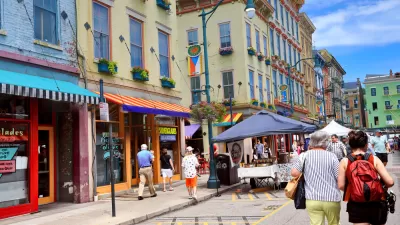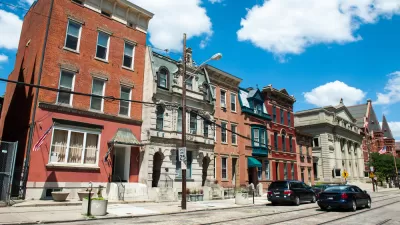A new study examines gentrification (measured by relative income) at the neighborhoods, revealing the unique case of Cincinnati, which increased wealth faster during the recession than it did during the preceding boom.

Randy Simes provides analysis of a report by the Federal Reserve Bank of Cleveland that examines gentrification during the pre-recession boom of 2000-2007 with what happened after by comparing the neighborhoods that either gained or lost wealth in those two periods.
According to the study, "the majority of 59 cities studied now fall between either a 1 percentile decline or 1 percentile increase between 2007 and 2010. This is in contrast to the housing boom period, which saw cities like Atlanta and Washington, D.C. move up 8.7 and 5 percentiles respectively."
"The results of their research found that only a select handful of regions reasonably continued to see relative wealth growth in their principal cities," adds Simes. The report also "detected one region that bucked the trend and actually increased its gains over the housing boom period": Cincinnati, which did not increase it's income ranking during the boom period before the recession, but increased on the same metric at a pace similar to that of Denver of Washington D.C. during the recession.
FULL STORY: Chart of the Day: Here's why Cincinnati's gentrification process is unique

Maui's Vacation Rental Debate Turns Ugly
Verbal attacks, misinformation campaigns and fistfights plague a high-stakes debate to convert thousands of vacation rentals into long-term housing.

Planetizen Federal Action Tracker
A weekly monitor of how Trump’s orders and actions are impacting planners and planning in America.

In Urban Planning, AI Prompting Could be the New Design Thinking
Creativity has long been key to great urban design. What if we see AI as our new creative partner?

King County Supportive Housing Program Offers Hope for Unhoused Residents
The county is taking a ‘Housing First’ approach that prioritizes getting people into housing, then offering wraparound supportive services.

Researchers Use AI to Get Clearer Picture of US Housing
Analysts are using artificial intelligence to supercharge their research by allowing them to comb through data faster. Though these AI tools can be error prone, they save time and housing researchers are optimistic about the future.

Making Shared Micromobility More Inclusive
Cities and shared mobility system operators can do more to include people with disabilities in planning and operations, per a new report.
Urban Design for Planners 1: Software Tools
This six-course series explores essential urban design concepts using open source software and equips planners with the tools they need to participate fully in the urban design process.
Planning for Universal Design
Learn the tools for implementing Universal Design in planning regulations.
Appalachian Highlands Housing Partners
Gallatin County Department of Planning & Community Development
Heyer Gruel & Associates PA
Mpact (founded as Rail~Volution)
City of Camden Redevelopment Agency
City of Astoria
City of Portland
City of Laramie




























